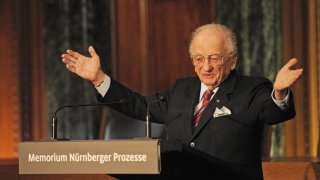
Ben Ferencz, the last living prosecutor from the Nuremberg trials, who tried Nazis for genocidal war crimes and was among the first outside witnesses to document the atrocities of Nazi labor and concentration camps, has died. He had just turned 103 in March.
Ferencz died Friday evening in Boynton Beach, Florida, according to St. John's University law professor John Barrett, who runs a blog about the Nuremberg trials. The death also was confirmed by the United States Holocaust Memorial Museum in Washington.
WATCH ANYTIME FOR FREE
Stream NBC10 Boston news for free, 24/7, wherever you are. |
“Today the world lost a leader in the quest for justice for victims of genocide and related crimes,” the museum tweeted.
Born in Transylvania in 1920, Ferencz immigrated as a very young boy with his parents to New York to escape rampant antisemitism. After graduating from Harvard Law School, Ferencz joined the U.S. Army in time to take part in the Normandy invasion during World War II. Using his legal background, he became an investigator of Nazi war crimes against U.S. soldiers as part of a new War Crimes Section of the Judge Advocate’s Office.
Get updates on what's happening in Boston to your inbox. Sign up for our News Headlines newsletter.
When U.S. intelligence reports described soldiers encountering large groups of starving people in Nazi camps watched over by SS guards, Ferencz followed up with visits, first at the Ohrdruf labor camp in Germany and then at the notorious Buchenwald concentration camp. At those camps and later others, he found bodies “piled up like cordwood” and “helpless skeletons with diarrhea, dysentery, typhus, TB, pneumonia, and other ailments, retching in their louse ridden bunks or on the ground with only their pathetic eyes pleading for help,” Ferencz wrote in an account of his life.
“The Buchenwald concentration camp was a charnel house of indescribable horrors,” Ferencz wrote. “There is no doubt that I was indelibly traumatized by my experiences as a war crimes investigator of Nazi extermination centers. I still try not to talk or think about the details.”
At one point toward the end of the war, Ferencz was sent to Adolf Hitler's mountain retreat in the Bavarian Alps to search for incriminating documents but came back empty-handed.
U.S. & World
After the war, Ferencz was honorably discharged from the U.S. Army and returned to New York to begin practicing law. But that was short-lived. Because of his experiences as a war crimes investigator, he was recruited to help prosecute Nazi war criminals at the Nuremberg trials, which had begun under the leadership of U.S. Supreme Court Justice Robert Jackson. Before leaving for Germany, he married his childhood sweetheart, Gertrude.
At the age of 27, with no previous trial experience, Ferencz became chief prosecutor for a 1947 case in which 22 former commanders were charged with murdering over 1 million Jews, Romani and other enemies of the Third Reich in Eastern Europe. Rather than depending on witnesses, Ferencz mostly relied on official German documents to make his case. All the defendants were convicted, and more than a dozen were sentenced to death by hanging even though Ferencz hadn't asked for the death penalty.
“At the beginning of April 1948, when the long legal judgment was read, I felt vindicated,” he wrote. “Our pleas to protect humanity by the rule of law had been upheld.”
With the war crimes trials winding down, Ferencz went to work for a consortium of Jewish charitable groups to help Holocaust survivors regain properties, homes, businesses, art works, Torah scrolls, and other Jewish religious items that had been confiscated from them by the Nazis. He also later assisted in negotiations that would lead to compensation to the Nazi victims.
In later decades, Ferencz championed the creation of an international court which could prosecute any government’s leaders for war crimes. Those dreams were realized in 2002 with establishment of the International Criminal Court in The Hague, though its effectiveness has been limited by the failure of countries like the United States to participate.
Ferencz is survived by a son and three daughters. His wife died in 2019.



